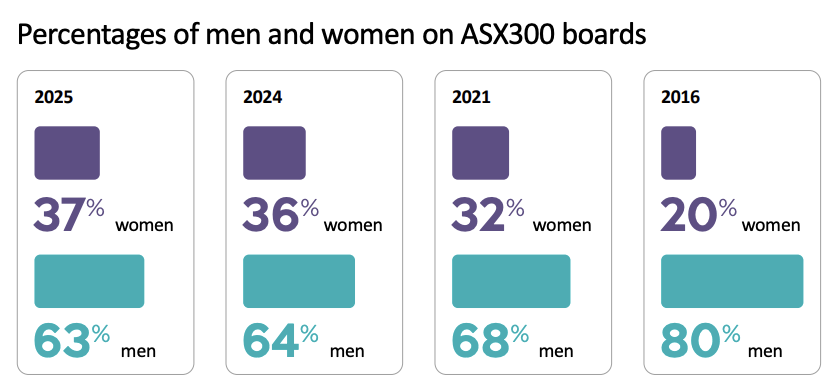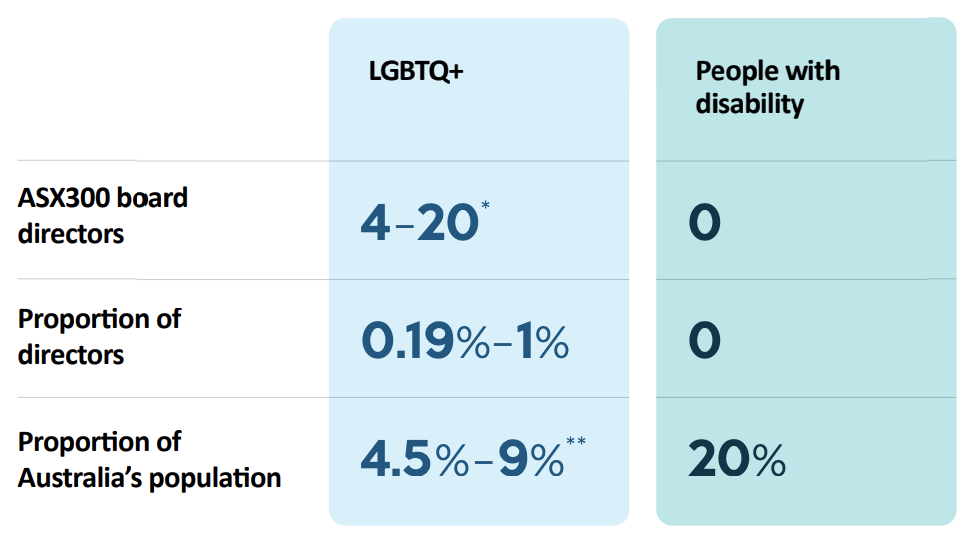
Australian index reveals stagnation, decline in other forms of diversity

Gender diversity in Australian boards has improved since 2024, but broader diversity gaps continue to persist, according to a new report.
The 2025 Board Diversity Index, in its 11th edition, recently analysed the boards of ASX300 firms to determine their progress in diversity based on publicly reported data as of January.
There are a total of 2,100 board seats in Australia, according to the index, where 37% or 781 roles were filled by women.
This is a slight increase from the 36% or 755 roles that were occupied by women in the previous year, and nearly double the 399 seats in 2016.

According to the report, 73% of ASX300 boards have 30% or more women, while there were 40 boards with zero or just one.
Despite the progress recorded in terms of gender, the index found that other forms of diversity have stagnated or declined.
It noted that Anglo-Celtic directors now make up 91.9% of boards, up from 91.2% last year.
There are also only five Indigenous directors occupying seven board seats in the ASX300, despite many major companies having Indigenous advisory committees for years.
Brad Welsh, non-executive director at NIB Holdings, said Indigenous advisory committees shouldn't be the end point for organisations.
"Without a deliberate focus on developing and elevating Indigenous business talent, these structures risk becoming ceilings rather than pathways — well-meaning but ultimately sidelined from core commercial and governance conversations," Welsh said in the report.
Meanwhile, the report also noted that there were only four directors on the ASX300 who identified as members of the LGBTQ+ community.
It stressed, however, that this doesn't "fully capture the true representation" amid privacy concerns and fear of judgment surrounding the disclosure of sexuality among leaders.
"Therefore, the actual number of LGBTQ+ directors could be higher than reported," the report said.
In terms of people with disabilities, the report did not record any company board members with a disability.

"While gender representation has improved, real inclusion across other dimensions remains limited," said David Evans, Managing Partner at Watermark Search International, in a statement.
"The opportunity is clear — by embracing diversity, Australian businesses can build stronger, more resilient, and globally competitive organisations. Diversity is about ensuring access to the widest pool of talent, expertise, and perspectives to drive business value."
The findings come amid growing uncertainty on diversity and inclusion efforts in workplaces overseas, particularly in the United States under President Donald Trump's administration.
There have been concerns that Australian businesses would soon mirror the growing withdrawal from diversity, equity, and inclusion (DEI) in the US.
However, data from the Australian Institute of Company Directors (AICD) revealed that 84% of directors said their boards remain committed to diversity and inclusion.

This commitment extends to the workforce, after findings from Rippling's Workforce Dynamic Report 2025 also revealed that 39% of employees would quit if DEI wasn't prioritised by their organisation.
Mark Rigotti, Managing Director and CEO at the AICD, commented that diversity is fundamental to effective governance.
"When directors bring different life experiences, professional backgrounds, and ways of thinking to the table, organisations are far better positioned to respond to risks, seize opportunities and deliver long-term value," Rigotti said in a statement.
"It's important to create a culture around the board table where every voice is heard, respected and considered. That's where the real value lies — not in meeting targets, but in fostering richer discussion, and better decision-making."
Tharani Jegatheeswaran, Partner, National Client Relationships Leader at Deloitte Australia, also noted that diverse experiences in leadership can help boards challenge assumptions and anticipate change.
"In today's environment, that's not just beneficial — it's vital. The boards that embrace this will be better positioned to drive growth and deliver stronger outcomes for the organisations and stakeholders that they serve," Jegatheeswaran said in a statement.